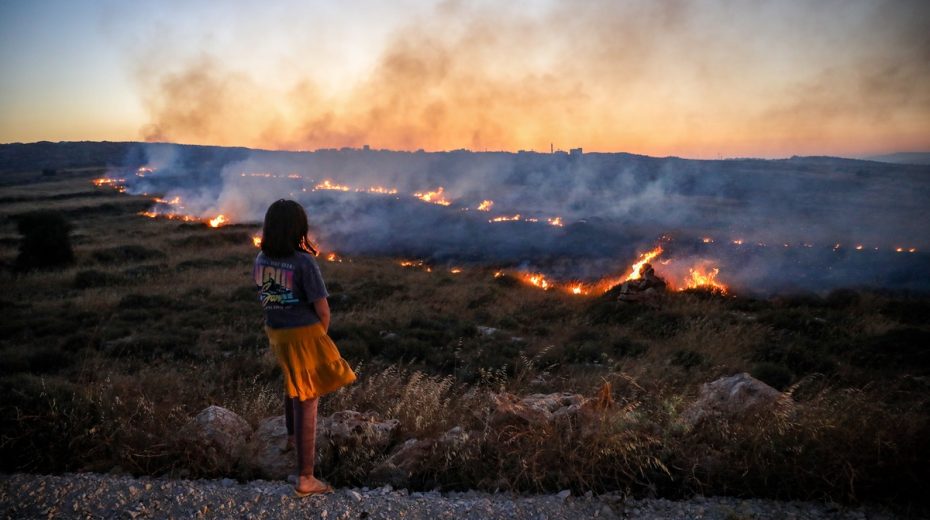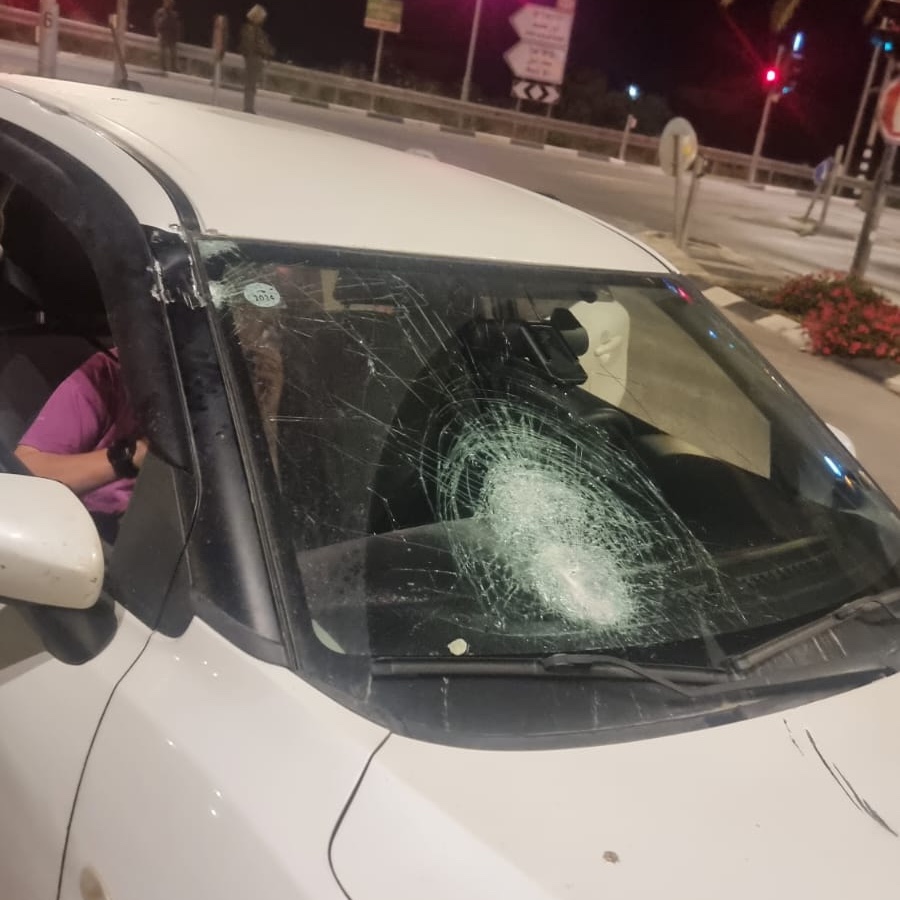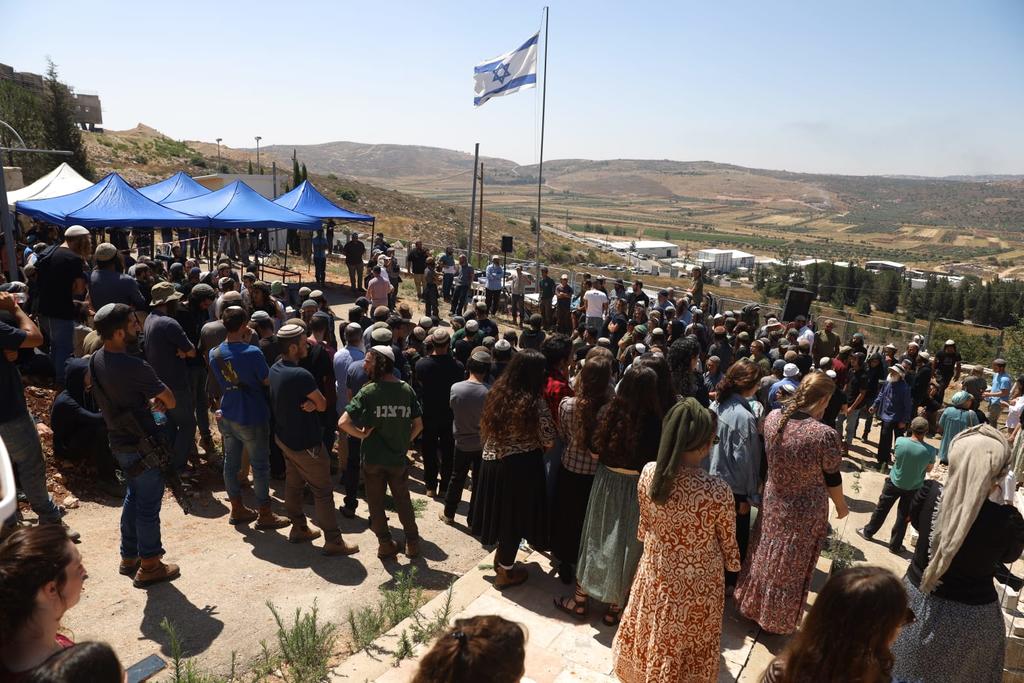Palestinians Besiege Jewish Settlements; Miraculously, No Casualties
Israel inches closer to full-scale military operation in response to escalation in terrorist violence.

On Thursday night a Palestinian mob attacked Israeli motorists, blocked roads and effectively besieged two Jewish settlements to the north of Jerusalem. Security officials later said it was a miracle no one was killed.
The disturbances began on Highway 60 near the large Jewish settlement of Ofra, where Palestinians hurled stones at Israeli cars.
Just a little to the west, in the heart of the Binyamin region, another Palestinian mob also began attacking Israeli vehicles with stone and fireworks, and blocked Road 465 that connects the two small Jewish settlements of Neve Tsuf (also known as Halamish) and Ateret to the main highway.
The mob also attacked Jewish cattle herders who were out in the fields near Ateret.
A number of Israeli vehicles were damaged, and one 15-year-old Jewish girl was lightly wounded.
Considering that Ateret and Neve Tsuf were effectively cut off and besieged for four long hours, a security official told the Tazpit Press Service that it was a “miracle that residents were not lynched, that there were no serious Israeli casualties.”
The source called for an investigation into how and why it took so long for the IDF to gain control of the situation.

Israel mulls large-scale military operation
Last night’s incident and a string of other attacks in Samaria in recent days and weeks are increasing the likelihood that Israel will soon launch a large-scale military operation against the terrorist infrastructure there. Jewish residents of the area have been calling for such action for some time.
A series of situational assessments held on Tuesday by IDF Chief of Staff Lt. Gen. Herzi Halevi, first at the scene of the deadly Eli shooting attack, and later at IDF Central Command in Jerusalem, together with Defense Minister Yoav Gallant and Prime Minister Benjamin Netanyahu, charted out Israel’s next steps in its war on terror.
The results of those decisions will soon be visible on the ground.
Changes on the Ground
Already on Wednesday night, an IDF drone strike killed three Palestinian terrorists in a vehicle who had fired on soldiers manning a checkpoint north of Jenin. The terror cell was responsible for other shootings in the area. It was the IDF’s first use of an aerial drone for a targeted killing in Judea and Samaria since 2006.
IDF Spokesperson Brig. Gen. Daniel Hagari stated that the military will act anywhere it has intelligence regarding terror plots, adding that in this case there was no such prior warning.
But recent events appear to suggest that specific, preemptive actions to thwart terror cells, actions that have undoubtedly saved the lives of hundreds of Israelis over the past year, are no longer enough.
On Monday, the IDF had to call in a helicopter strike in Jenin for the first time since 2002, the dark days of the Second Intifada, to facilitate the evacuation of wounded security personnel. What was supposed to be a routine arrest operation became a severely entangled affair, as armored Panther IDF vehicles were targeted by powerful explosive devices buried under the road as Palestinian gunmen showered them with gunfire.
The IDF returned fire, killing five Palestinian combatants. After several hours, the Israeli units and vehicles were extracted.
These scenes mean Jenin is rapidly spinning out of control, and that IDF freedom of action is under a new level of challenge there. The security situation is changing for the worse.
Red flags
The recent incidents follow other red flags, including several shootings in the area, such as a drive-by shooting at Israeli civilian and military vehicles on June 13, injuring an Israeli civilian and four soldiers.
On May 30, 32-year-old father of two Meir Tamari was murdered in a drive-by shooting near Hermesh, west of Jenin. In the days preceding that attack, Palestinian gunmen fired on Mevo Dotan in northern Samaria and Gan Ner in Gilboa.
The number of shooting attacks in the first half of 2023 is already at 120 in Judea and Samaria, commonly known as the West Bank, while for all of 2022 the number was 285. When compared to the number of shootings in 2021—61—or the number of attacks in 2020—31—the wider problem becomes clear.
Samaria is flooded with guns, and with terrorists highly motivated to use them.
According to figures released on Tuesday by the Meir Amit Intelligence and Terrorism Information Center, the number of significant terror attacks in Judea and Samaria remained elevated throughout 2023.

A complex security landscape
Localized terror groups with names like Lions’ Den and the Jenin Battalions are joined by established terror factions Hamas and Palestinian Islamic Jihad, which back them with cash, arms and political support.
As local terror entities proliferate despite nightly IDF operations, Hamas and Islamic Jihad are deepening their foothold as well. The result is Jewish civilians under constant threat.
Whereas once Hamas insisted that those who act with its support swear allegiance to it, it has since dropped such conditions, recognizing that a new and more independent generation of Palestinians in Samaria can be activated with incitement and terror financing, without the need for direct allegiance.
If Israel wishes to prevent the violence from engulfing more southern areas where the PA currently is still in control — Ramallah, most of Hebron and Jericho — it may need to switch course sooner rather than later, and initiate a larger security operation.
Such an operation won’t be a second “Operation Defensive Shield,” as conditions on the ground have changed dramatically since 2002, but rather a more limited affair that targets terror infrastructure in Samaria, though still broader than the current pinpoint operations.
This could still have a significant impact and help turn back the tide of terrorism, at least for a time.
A Zionist response
Meanwhile, local residents are responding to the wave of Palestinian violence with “Zionism.”
Namely, they are advancing the settlement enterprise in accordance with Israel’s biblical mandate.
A new outpost community was established in the Binyamin region of Samaria on Wednesday night, near where the Eli attack occurred.
Called “Hamore,” it is located between the towns of Eli and Ma’ale Levona.
According to its founders, Hamore strengthens the Jewish hold on the area by creating a sequence of communities with Givat HaRoa’a and Givat Harel.
“The army must fight the enemy and enter the nests of terrorism. The settlement must work to deepen its roots. The residents of [the] Binyamin [region] are pioneers and determined to strengthen the settlement bloc and the succession of settlements in the region,” said Israel Gantz, head of the Binyamin Regional Council.
Netanyahu’s government similarly announced it was fast-tracking plans for 1,000 new housing units in Eli.
A statement issued by the Prime Minister’s Office on Wednesday said, “Our answer to terrorism is to strike it hard and build our country. It was agreed upon to immediately advance the planning of approximately 1,000 new housing units in Eli, adjacent to the site of the attack.”
The developments in Hamore and Eli comes on the heels of an Israeli Cabinet decision on Sunday to advance plans for 4,000 housing units in Judea and Samaria on Sunday.
No comments:
Post a Comment